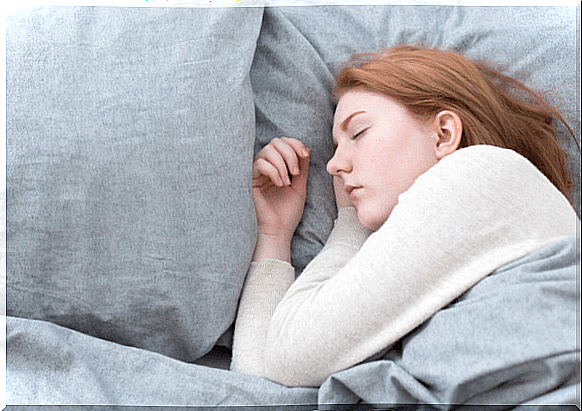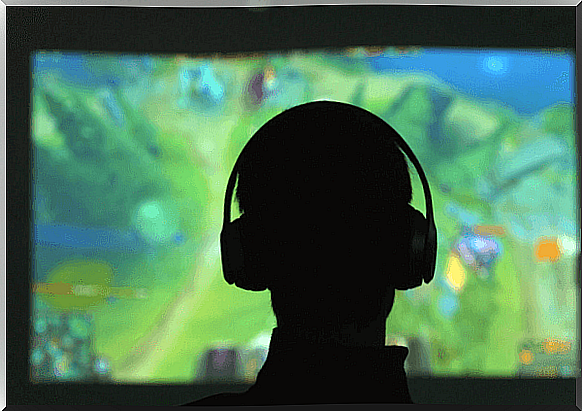Teenagers And Sleep: Why Do They Need So Much?

For many parents, sleeping until noon means laziness and lethargy. They wonder about the relationship between teens and sleep, and why teens sleep so much. They think it means they have no ambitions and are wasting their lives.
In addition, it is often related to other behaviors that young people exhibit. Such as when they are not cleaning the room.
Laziness is something that can make any parent angry. Even more so if their children complain if they try to get them up before noon. With their straight hair and marks from the pillow, the teenager lies across the table at dinner, is irritable and has a fluctuating mood.
What many parents do not know is that it is perfectly normal for teens to sleep more than usual. Documentation proves that this is part of the imbalance that takes place at this very point in life.

Testosterone, teens and sleep
Hormonal changes, among other things, change the sleep pattern of the young man. Their brain is reprogrammed at the age of 11-12, and the testosterone receptors modify their melatonin rhythm
Thus, it is neither of resistance nor reluctance, but simply the normal activity of the body.
Technology, teens and sleep
Like hormones, the use and abuse of technology also contributes to the changes in melatonin rhythm. There are already numerous studies on the use of cyber technology in terms of computer and console games.
Teenagers spend a lot of time playing on them. Additionally, it is known that these games can cause conditions that can range from addiction to ADHD.
Once homework is done, the teenager often stays up in cyberspace for a long time. And in some schools, students have to start early in the morning. This means that they only get a few hours of sleep at night (about 6 hours). However, this stage of their development requires that they sleep at least ten hours.
This would suggest that schools, since teens tend to get up later (because of their chronobiology, not their computer use), should start later to make learning more effective.
Computer games
Computer games are exciting and competitive with lots of color and action. They encourage the teenager to keep going until they either win or level up. This kind of technology is exactly what triggers adrenaline, cortisol and dopamine. Together, it gives a shot of energy, power and well-being.
Adrenaline triggers the reflexes and allows quick reaction. Cortisol keeps you awake and active. And dopamine affects the way you seek pleasure and reward.
These computer games are played in artificial light. This reduces melatonin levels, which are essential for being able to fall asleep. Therefore, teenagers do not feel tired when they should.
Along with all this, there is something else that is important to remember. Teenagers, regardless of their gender, do not know their own boundaries. Therefore, it is quite common for them that they are not aware that they should turn off the internet and get some sleep.
Parents should set clear boundaries and guidelines. In addition, it is their responsibility to tell their children how to use consoles and computers safely.
Estrogen, teens and sleep
As with testosterone in boys, estrogen in girls alters their emotions, cognition and body in many different ways, including their sleep. Estrogen receptors are activated in the brain cells and affect it
Not only does estrogen affect the brain cells that control breathing. It also activates the sleep rhythm and growth hormones in girls. Girls begin to change their sleep patterns at 8-12 years of age.
Sleep regulation and the pineal gland
The supracharismatic nucleus is the center that regulates the melatonin rhythm via the cone gland. The pineal gland is a group of neurons from the medial hypothalamus.
The supracharismatic core creates your inner clock. It receives information about the ambient light through the eyes, more specifically the retina. The retina contains photoreceptors that distinguish between colors and shapes.
The supracharismatic core receives information about the external light-dark cycle. It then interprets it and sends it to the upper cervical ganglion. From there, the signal is redirected to the pineal gland, which responds by secreting the hormone melatonin. The release of melatonin is low during the day and increases at night.
Melatonin and serotonin
Serotonin is a previous hormone of melatonin. Serotonin is a hormone that has to do with well-being and relaxation. Thus, if you are relaxed and happy late at night, melatonin will be easier to absorb.
If, on the other hand, you are in a stressful situation, cortisol will make it difficult for you to fall asleep. This is because cortisol has the opposite effect of serotonin and will inhibit the production of melatonin. Therefore, when teens get excited about their computer games , cortisol will keep them from sleeping.

Brain waves and sleep between childhood and adolescence
Research shows that boys ‘and girls’ brain waves at age nine are identical during sleep. However, by age 12, girls have altered their sleep brain waves by 37% compared to boys (Brizendine, 2006).
Researchers conclude that girls ‘brains develop faster than boys’. Campbell points out that the extra synapses in girls’ brains are reduced earlier than in boys. This causes their brain circuits to mature faster.
Another important detail is what sleep specialists call circadian rhythms. They are related to the effect of cortisol in the body.
- There are larks with a daily rhythm that naturally get up early every day. These are the kind of people who find it difficult to party until late at night.
- There are owls that can sleep until noon or later. They come alive at night and are awake for hours.
Teenagers and sleep: Sleeping until noon or later is not always due to laziness
Taking all this into account, it is not always laziness that causes the teenager to sleep until noon or later. There are undoubtedly biological circumstances that one cannot get around.
However, if we omit to talk about larks and owls, there are, of course, some teenagers who are simply lazy and irresponsible. Not everything is due to hormonal disorders, owl rhythms or nightly use of technology.
It is therefore extremely important to consider each situation separately. Depending on the cause, parents can decide whether or not to set limits on their child’s use of technology.
It is not a teenage crime to sleep until noon, and not at all if it only happens once in a while. However, if it happens repeatedly, you need to find out the cause and take the necessary precautions to solve it.









